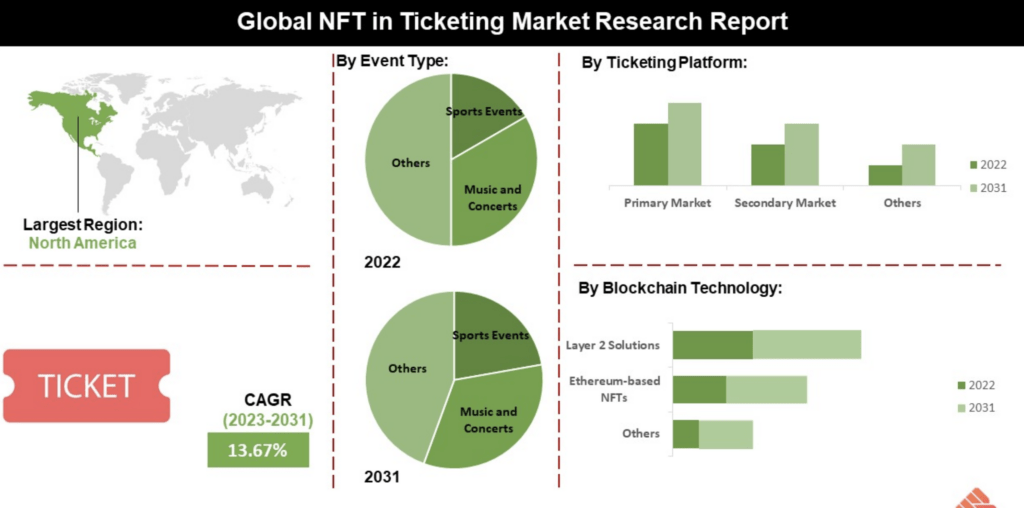Incorporating NFTs into the ticketing sector is set to witness substantial expansion, with a projected Compound Annual Growth Rate (CAGR) of 13.67% from 2023 to 2031, as per a report by InsightAce Analytic. This potential rise in the NFT ticket market indicates a significant transformation in ticket management, presenting security, personalization, and interaction prospects.
Revolutionizing Ticketing with NFTs
NFTs are primed to tackle longstanding challenges in the ticketing realm. Their distinct digital proof of ownership and legitimacy can help eradicate fake tickets, establishing higher security and reliability.
For both event organizers and participants, NFTs usher in a new era where ticket scalping is minimized, and authentic fan engagement is created through access to exclusive content and experiences. Despite these benefits, the widespread adoption of NFTs in ticketing encounters obstacles like high transaction costs and the intricacy of blockchain technology that may discourage potential users, according to the report.

Regional Dynamics and Emerging Trends
The Asia Pacific region is emerging as a frontrunner and is projected to become the primary market for NFT ticketing, thanks to its big population of NFT enthusiasts and vibrant event-hosting culture. Nations such as India, Vietnam, Japan, Singapore, and the Philippines lead the way, providing fertile ground for NFT ticketing implementations. Meanwhile, North America could see swift expansion, leveraging its technology and dominance in blockchain innovation.
Nevertheless, the journey ahead has some challenges. Elevated blockchain-related transaction fees could inflate ticket costs, potentially deterring a portion of prospective event attendees. Furthermore, the technical complexity and ecological implications associated with NFTs and blockchain technology necessitate innovative solutions to render NFT ticketing accessible and sustainable.
The Rise of NFT Ticketing Solutions
Last year, GET Protocol, a leader in NFT ticketing technology, secured an investment of $4.5 million. This development represents a significant achievement for the startup and challenges traditional ticketing companies’ dominant position. It could indicate a changing landscape within the ticketing industry.
Furthermore, Korean artists are adopting blockchain and NFT technology to address the issue of ticket reselling in the music industry. Hyundai Card is at the forefront of this initiative, implementing NFT tickets for Jang Beom-june’s concert in Seoul. The company has pinpointed automated buying programs and bulk-buying behaviours as primary concerns.
Hyundai Card’s strategy involves a lottery system for ticket allocation that uses blockchain to generate random numbers, promoting a fair distribution process. This method securely manages ticket purchases, storage, and usage within their app, reducing the chances of unauthorized resales.
The use of NFTs in ticketing represents a significant improvement, offering event attendees a safe, clear, and engaging experience. While the industry faces challenges like high costs and complex technology, the opportunity for NFTs to transform ticketing is vast.



